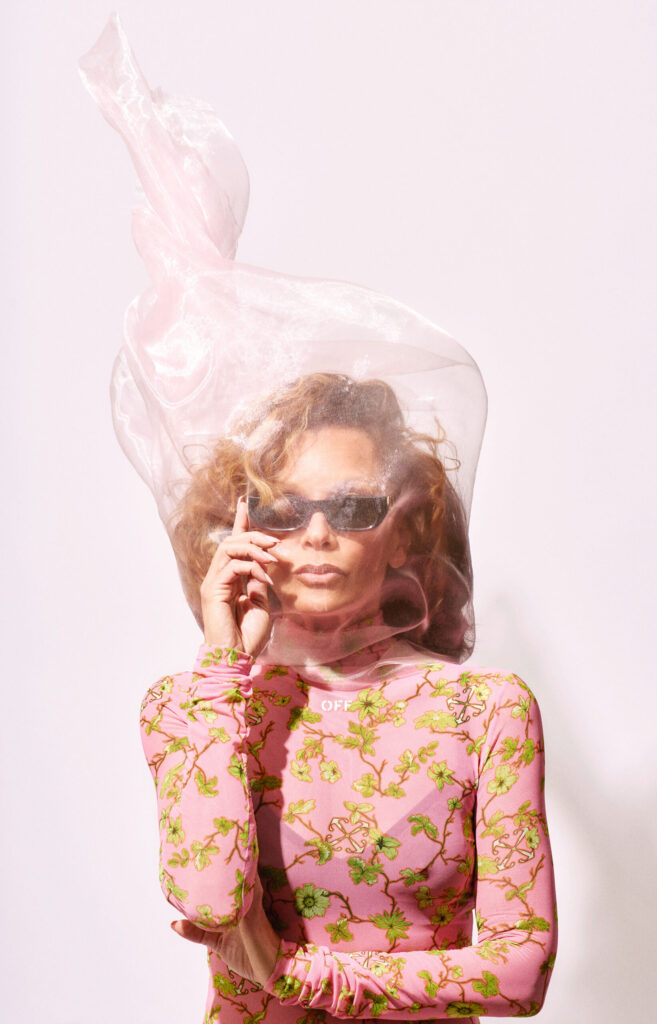Vanessa Williams wears Dress and Sunglasses Off-White™.
Over the last 40 years, Vanessa Williams has made her mark—both as a hit recording artist and as a beloved stage and screen star who, with her cunning wit and commanding presence, has carried Broadway smashes like Kiss of the Spider Woman and Emmy-winning series like Ugly Betty. Now, at 61 years old, the former Miss America is conquering London’s West End, where she’ll bring the fictional fashion editor Miranda Priestly onstage for the very first time in The Devil Wears Prada. “I love dipping into powerful women,” she tells her music collaborator Trixie Mattel over Zoom, a drag queen who understands what it takes to play a venomous diva. “I think that’s what’s made me a fighter.”
———
FRIDAY 5 PM JUNE 28, 2024 PLYMOUTH, UK
VANESSA WILLIAMS: Look at that fabulous room!
TRIXIE MATTEL: Oh, it’s all that Queen of the Universe money, Vanessa. Where are you right now?
WILLIAMS: I’m backstage at the Theatre Royal Plymouth. That’s my drag for Miranda Priestly right there. Pamella Roland did half of my stuff. I’ll do a little show-and-tell. Let’s see. This is for a fashion show when I go crazy and I sing a song called “Stay on Top.” This is my Prada dress when I’m in Nigel’s office.
MATTEL: Oh my god.
WILLIAMS: This is Akris, for when I’m caught in Miami. “Get a plane. That’s your job.” This is Dior, it has a beautiful tulle skirt. Gorge. And then Tom Ford with a Gucci blouse. And this is another fur to throw on top. And then this is my Met Gala ballgown, which is incredibly amazing. We’re killing it.
MATTEL: When that’s the inner lining of an outfit, you know it’s serious. And you don’t have to wear your real hair or anything? You just—
WILLIAMS: No, I’m wearing a big, severe French twist. And then I do a wet look when my husband leaves me.
MATTEL: I remember when the show was announced, and the world’s reaction was, like, “This is perfect.”
WILLIAMS: [Laughs]
MATTEL: You’re so chill and positive, and you’re so funny. But where does this gift come from—playing the ice queen?
WILLIAMS: On Broadway it was Kiss of the Spider Woman. She wasn’t an ice queen, but she was definitely a diva, and it took some cojones. That bought me my Broadway props, and then I played a pop singer who was a nightmare for A Diva’s Christmas Carol. After that, I just kept getting cast in roles like Wilhelmina Slater [Ugly Betty], and now this.
MATTEL: Fans of yours must be disappointed when they meet you in real life and you’re incredibly warm and nice. They’re like, “Dang, I thought she was going to yell at me or something.”
WILLIAMS: Exactly. It’s good to have some fear, though. It keeps people at a distance. [Laughs]
MATTEL: Completely. This is not your first major private little dressing room. Do you have a little ritual? Do you have little items?
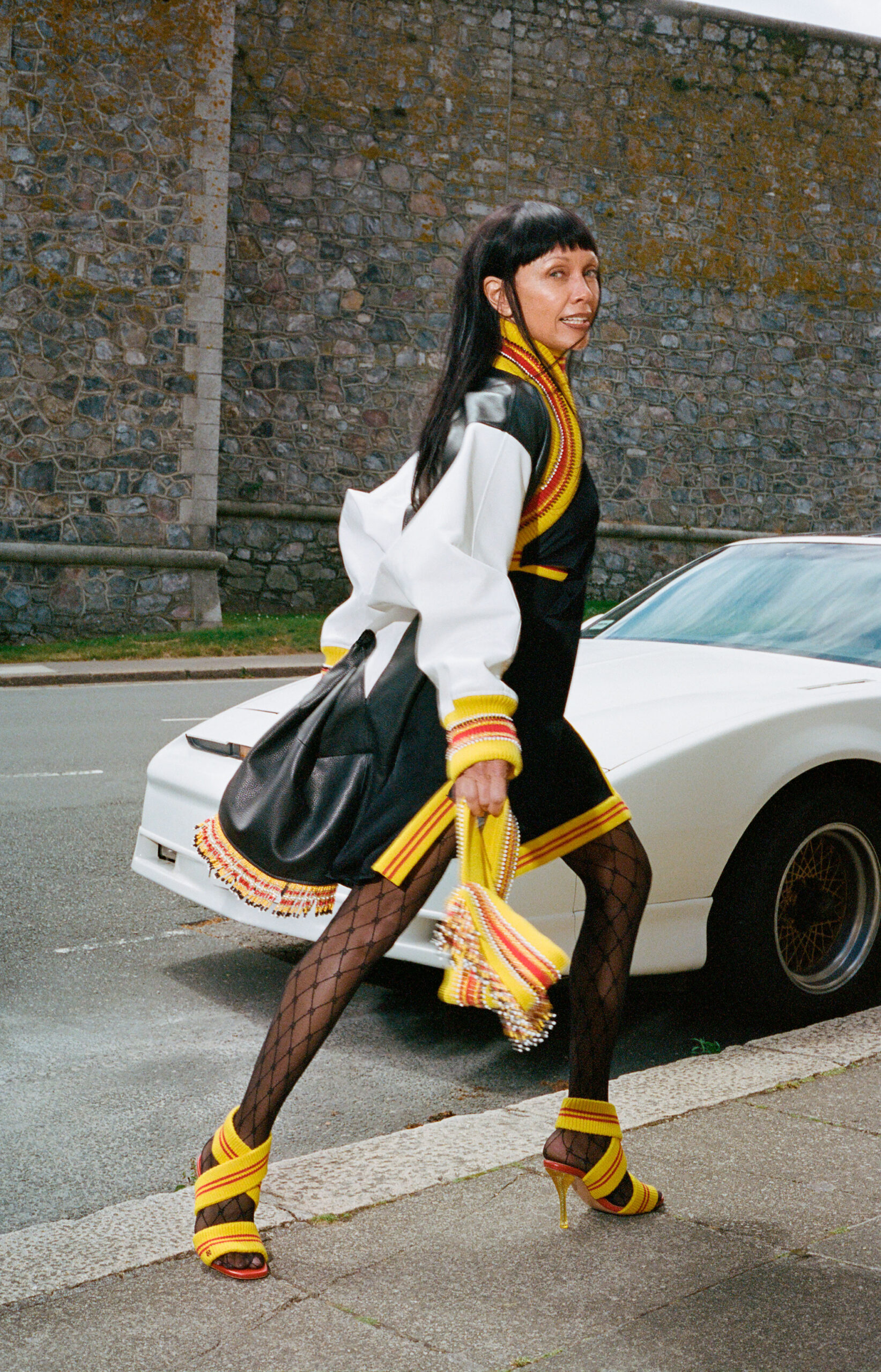
Jacket, Dress, Bag, Tights, and Shoes Off-White™.
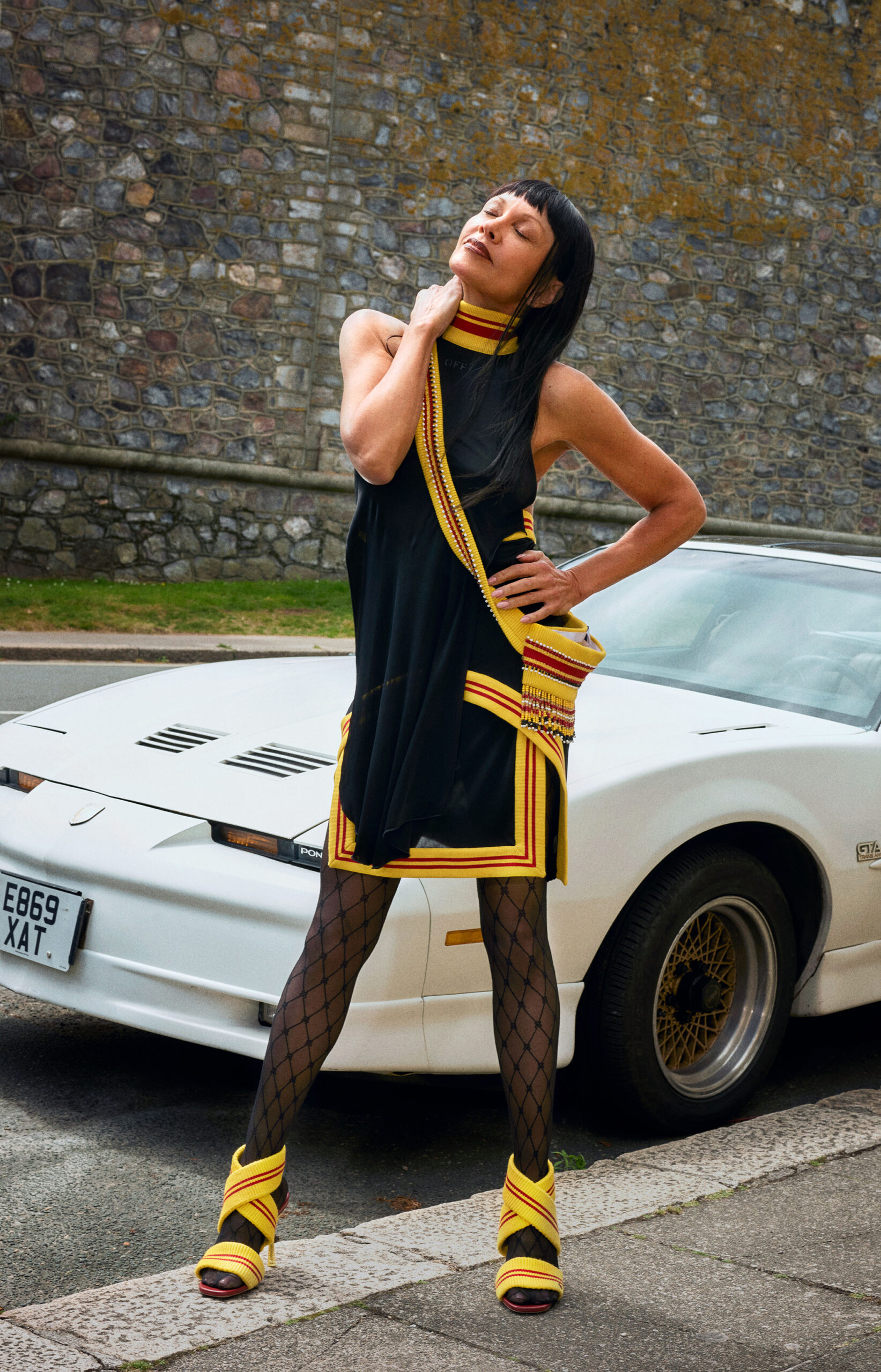
Jacket, Dress, Bag, Tights, and Shoes Off-White™.
WILLIAMS: Always keep a fan available. Always have a candle. Always have music playing. And then I’ve got my makeup, because you have to do your own makeup. What other tricks do I have? A tea kettle, my ginger chews—my gin gins, live on those.
MATTEL: Nothing too eccentric?
WILLIAMS: No, no, no. On Broadway, you can pick your paint color and your carpet color. Last one I did for POTUS, I had a smoked oyster color and then I brought in this beautiful oil painting of a horse with a gorgeous gold frame and some plants and stuff. So this is—it’s not slumming it. They made it very nice. But when I get back to New York, I’ll have all my favorite treats.
MATTEL: If you’re doing Miranda on Broadway, I want to know what that dressing room’s going to look like.
WILLIAMS: I might have to do red. It’s the signature color for my role—but the great thing is, I’ll be here for over a year. I open next Saturday and we run until August 17, go home for six weeks, then I’m back at the end of September until October 2025.
MATTEL: Geez.
WILLIAMS: So it’s a commitment. And then, if we go to Broadway, that’s another commitment, which is fine. I’ll be doing this role for the next couple of years.
MATTEL: I just had an actual Anna Wintour moment. I was doing a press tour and I’m sitting in the lobby at Condé Nast and my assistant goes, “Oh my god. Turn around right now.” And Vanessa, it was hot. My corset was so tight, my feet hurt, and I just didn’t turn around with the right energy. I’m such a drag queen, I thought it was an impersonator, because of the bob with the glasses. And then immediately I was like, “Great, I just glared at Anna Wintour.”
WILLIAMS: She didn’t crack a smile?
MATTEL: No. I think she’s seen enough drag queens in her day. Kind of like you, Vanessa.
WILLIAMS: [Laughs] Speaking of Queen of the Universe, that was our drag homecoming.
MATTEL: Gosh, I loved getting close to you on that show. Sometimes I felt like, with the queens and the drama and everything, you and I were live reporters on the scene. I’d be like, “That girl’s crying. There’s pyrotechnics over here.” It was like The Hunger Games.
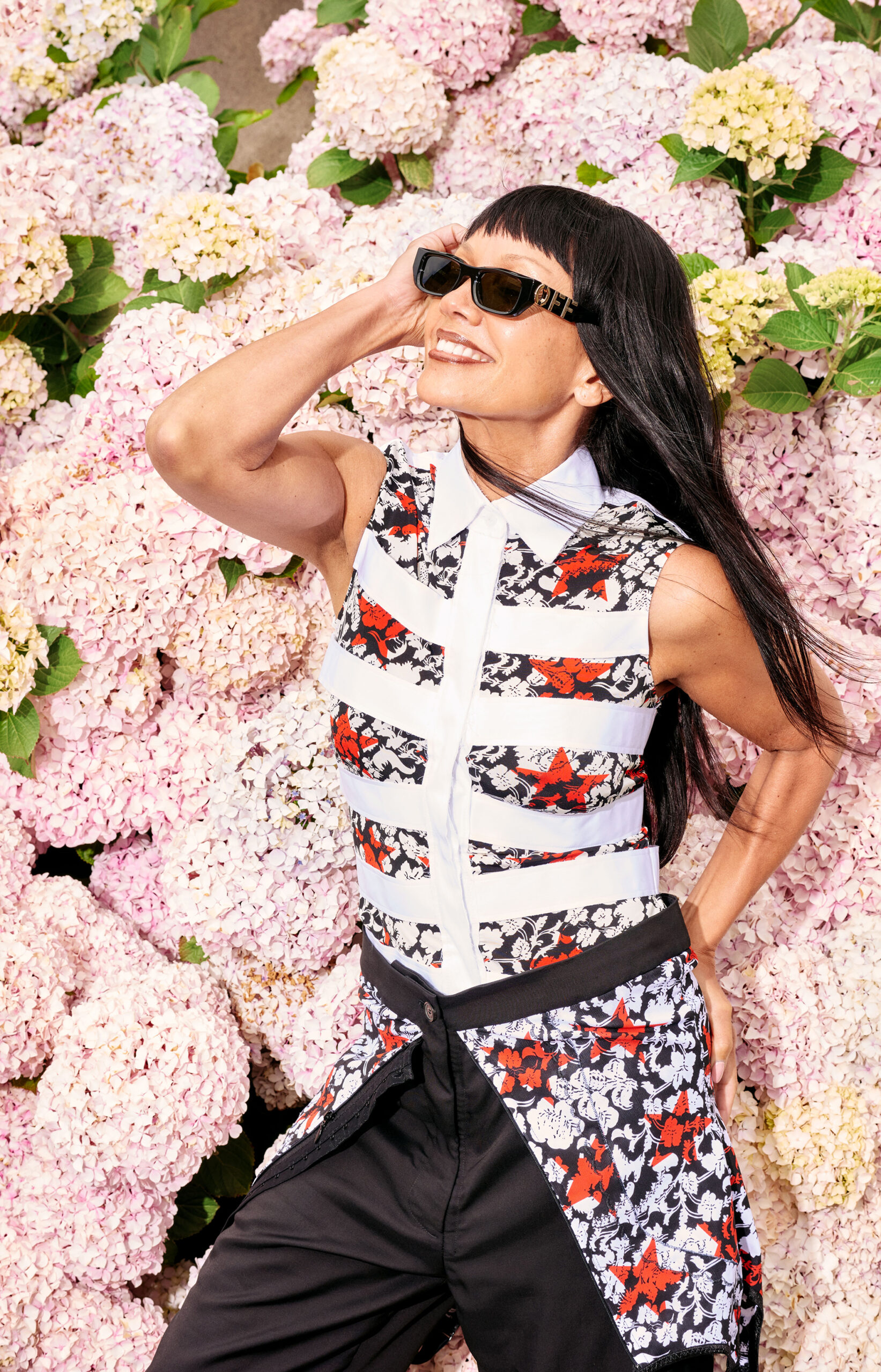
Top, Pants, and Sunglasses Off-White™.
WILLIAMS: Totally.
MATTEL: Vanessa, what was your earliest memory of wanting to be a performer?
WILLIAMS: Probably seeing the Rockettes at Radio City [Music Hall]. I grew up in Westchester County, so we would always go into the city for holiday stuff—The Nutcracker and the Christmas Spectacular. And my mom was always planting seeds, like, “Maybe you could be the first Black Rockette”—which were her ambitions, I’m sure. That was when I was a dancer, so I loved seeing the synchronicity, but also the glamour, the costumes, and the music and the showbiz of it all. And then I went to see The Wiz. I was probably 12, and I saw Stephanie Mills as Dorothy and I was like, “Wow, not only is she a powerhouse, but that looks like a lot of fun.” I knew, like, “Broadway is a train ride away from me. If I get the right audition, if I major in musical theater, it could happen.”
MATTEL: I think that’s probably part of your success, Vanessa, is that you saw point A and point Z and you weren’t afraid of the steps in-between.
WILLIAMS: Yeah. I was lucky. Both my parents were music educators. They never said, “Get a real job.” They believed in me.
MATTEL: Did anybody else inspire you growing up?
WILLIAMS: Lena Horne. Variety TV—I was born in 1963, so we had a lot of that growing up. I remember seeing Debbie Allen in a summer show called 3 Girls 3.
MATTEL: Oh yeah.
WILLIAMS: Diahann Carroll when she used to do Julia—she was gorgeous. She played a nurse but her lips were always amazing. [Laughs] Eartha Kitt in Batman, bringing the glam and the drama. And the variety shows of the day—watching Carol Burnett and Sonny & Cher and—
MATTEL: I wish there was more of that now.
WILLIAMS: Everyone’s been trying to bring them back and they don’t work for some reason.
MATTEL: I would watch a holiday Vanessa show.
WILLIAMS: I did that in ’96 on ABC [Vanessa Williams & Friends: Christmas in New York]. I had on Shania Twain, nobody knew who she was.
MATTEL: Oh my god.
WILLIAMS: Luther Vandross, Babyface, Savion Glover did a tap-dancing thing. And Rosie O’Donnell did a quick intro.
MATTEL: Geez. Vanessa, a lot of people’s introduction to you was as a pageant queen. How would you say doing pageants helped build you as a performer?
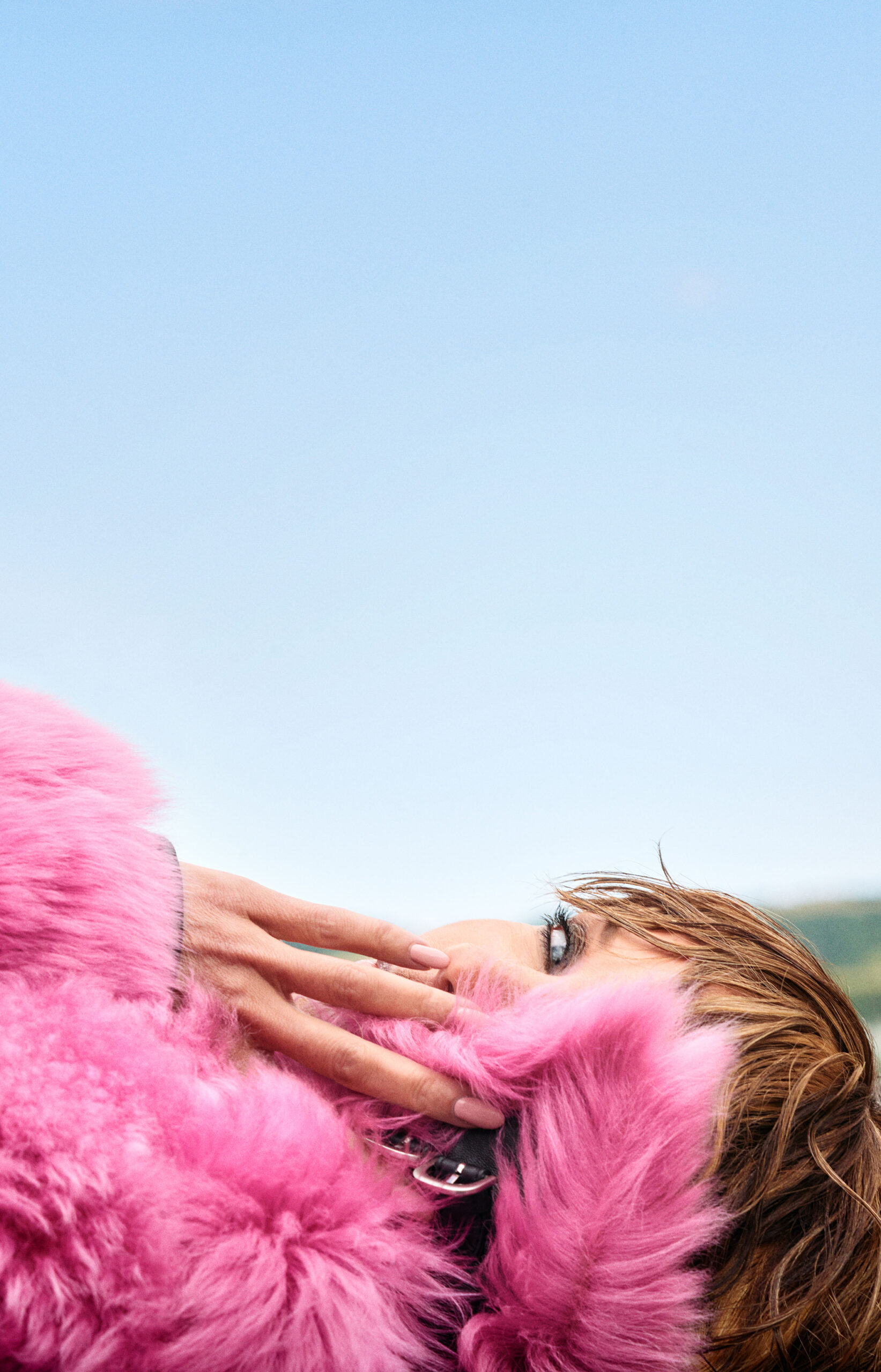
Jacket Off-White™.
WILLIAMS: Not at all, because I was a performer before I entered Miss Syracuse. I was at Syracuse as a musical theater major and in my sophomore year, I was in a bunch of productions. One of the pageant board members had seen me and asked one of my friends, “Do you think she would be one of the contestants for the Miss Syracuse pageant?” And I was like, “No, I’ve never done a pageant. I’m not into it.” I was supposed to do Cyrano de Bergerac, and the show was canceled. I had April free and called my mom; I said, “Do you think I should do this Miss Syracuse pageant?” And she’s like, “Is there scholarship money?” I said, “Yeah.” She said, “Well then do it.” My parents didn’t even come.
MATTEL: You were, like, 19?
WILLIAMS: I was 20 years old. I sang a song that I had done in performance class and my friend played piano for me. I won Syracuse in April, won New York State in July—and then when I got to Atlantic City, the pageant director for New York wanted me to sing Barbra Streisand’s “Happy Days Are Here Again.” So I did an upgrade on my gown, upgrade on my swimsuit, and I won the whole thing within six months. I wasn’t like those Texas girls—those girls that have been Little Miss This, That, for their entire life, and had their eye on the prize to be Miss America.
MATTEL: But it obviously became such a big part of your identity. You and I had dinner together in London, and you gave us a really vulnerable play-by-play of the time when Miss America crowned you and then later Penthouse published illicit photos of you [without your consent and your crown was revoked]. Do you think the world has evolved since then?
WILLIAMS: I don’t know. When I was 20, in 1983, my parents had lived through the Equal Rights Amendment. Martin Luther King was killed. Kennedy was shot the year I was born. They were a part of the civil rights era. I thought all those problems had been solved. I was from New York and I had plenty of friends of all nationalities, so when I won and started getting death threats—
MATTEL: This was before the photos?
WILLIAMS: Yeah. I was living in a bubble, thinking that we were beyond racism. I think the difference between 40 years ago and now is that the news cycle’s really sped up. People are quick to judge, quick to cancel, but it doesn’t remain in the zeitgeist for too long. Back in the day, you only had three major channels. I’d made history [as the first Black woman to win Miss America], so 10 months later, to have a scandal, it was a worldwide phenomenon. It was devastating. It was humiliating. Thank god I had a community and family that supported me and believed in my talent, because it took me years to regain respectability and to be seen for the person that I was. I’ve had to go through many hoops over and over again, and I still feel that. I’m always on the list of most underrated this, most underrated that. Well, guess what? That gives me my fuel.
MATTEL: I think today, people would not rally around a photographer who sold illicit photos of you against your will. But also, Vanessa, everything you’ve accomplished with this as part of your story is what makes it so magical. When I asked you, “Do you have any regrets?” you were like, “I’m Vanessa Williams. Can you name another major pageant competitor who’s done this, this, and this?” It’s all part of your recipe. You don’t pretend that it didn’t happen.
WILLIAMS: Yeah.
MATTEL: You’re such an angel in real life, but when you’re playing villains like Wilhelmina or Miss Priestly, how do you tap into that?
WILLIAMS: A, it’s the power on the page, and I love dipping into powerful women. B, my mother, who is a 4-foot-11 dynamo—my cousins call her “the Commander,” my uncle calls her a pain in the ass. All my kids are fearful of her. She’s been a mighty fighter her whole life, and she’s always trying to prove herself. She’s never afraid to share her thoughts, so she can be— I don’t want to say vicious. [Laughs] I love my mother. She’ll read this, so I have to make sure I—she’s got high expectations and you find in your life that you’re al- ways trying to please her. I think that’s what’s made me a fighter. But also as an artist, you’re never quite happy with the end result. You’re always like, “I can top that.”
MATTEL: I also think reducing a female character to a bitch is so reductive. Right? You saying it’s more about power is so much more interesting than saying, “She’s difficult,” or, “She’s tough.”
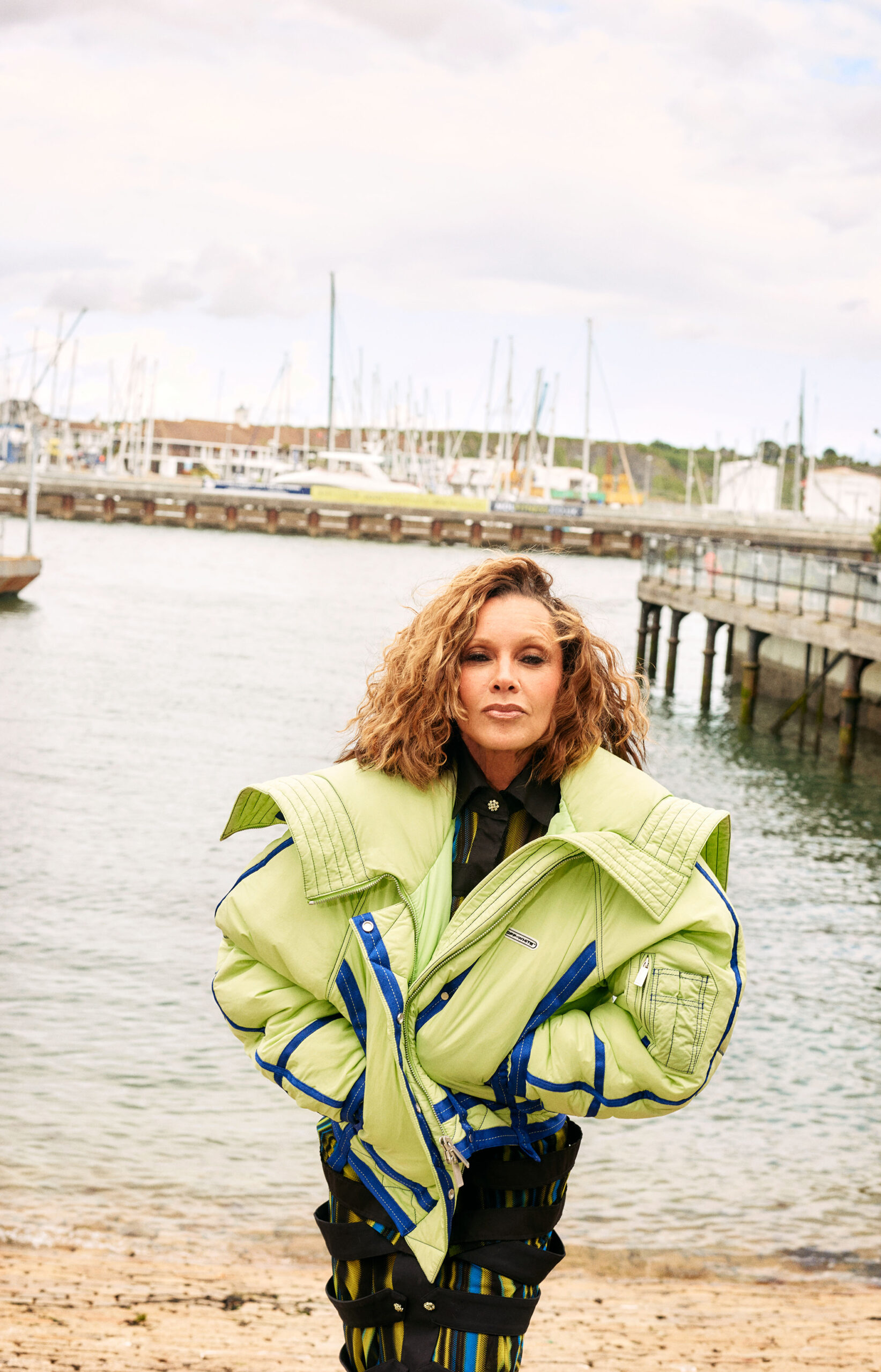
Jacket, Top, and Skirt Off-White™.
WILLIAMS: Absolutely. And at the end of The Devil Wears Prada, you realize that Andy has completely transformed herself and is ready to take on the world because of the lessons that she learned from Miranda. I was at a luncheon recently, and the woman who was sitting next to me was like, “I was the one that had to get the jet for Anna Wintour.” I go, “Tell me everything.” They had a Condé Nast retreat, I think it was out of Aspen, and Anna had to do some kind of speech. When she was finished, she wanted to go, and there was a whiteout and nothing was leaving. And she said, “Get me out of here.” So they had to find a car to drive Anna from Aspen in whiteout conditions, hoping she wouldn’t go off a cliff, to Vail to pick up the plane to go back to New York. I said, “Did she make it for the recital?” And she said, “There was no recital. She just wanted to get out of there.” [Laughs] I loved hearing that story because it’s all about power and she got what she wanted.
MATTEL: So you do stage and screen, and you do them both very well. How do you approach the two differently?
WILLIAMS: Well, for a stage it’s got to read in the back of the house, so I don’t have the luxury to do one eyebrow and have everybody understand what I’m trying to convey. It’s got to be bigger. Television and film, the lens is right here, so you can do all the subtle whispers and sighs and use your eyes in a much more diminutive way. And also you have the luxury onstage to burst into song, to help elevate and continue whatever emotion you just started. In television and film, you’re not in charge of your performance. It’s up to the editor.
MATTEL: That’s a good point. Do you have any pre-stage rituals?
WILLIAMS: Well, what I love about what they do here in England is, everybody warms up together as a group onstage. So everyone does a physical warmup, and it’s usually the dance captain, so it’s not just a couple stretches. Then you get to do the vocal warmup with a piano right there, and you’re doing all the massaging of this and banging of that. I love that discipline; they take their theater seriously here.
MATTEL: Well you know, Vanessa, they’re not implementing that discipline for you. They’re doing it for the green kids. [Laughs] This is horrible and I didn’t write this question, but if you had to pick one, is it acting or music?
WILLIAMS: I would say music, as I can act through my music. Speaking of, Elton John wrote the music for The Devil Wears Prada. How crazy is it that he’s writing me new material? Growing up, I heard Elton John on my transistor radio singing “Bennie and the Jets,” and now he’s like, “Oh, you’re brilliant. I love it. Thank you so much for doing my show.”
MATTEL: It’s really crazy that you’ve had all this success and you’re still having these moments where you’re like, “Whoa.” By the way, I’ve been playing “Legs (Keep Dancing)” everywhere.
WILLIAMS: Thank you so much.
MATTEL: And you have “BOP!” coming out July 14, which I couldn’t believe I got to do with you. Gay men are so difficult to impress; I can’t wait for the gay men who hated me in high school to be like, “I can’t believe you’re on a song with Vanessa Williams.” That’s my Elton John moment. [Laughs] Tell the kids what “BOP!” is about.
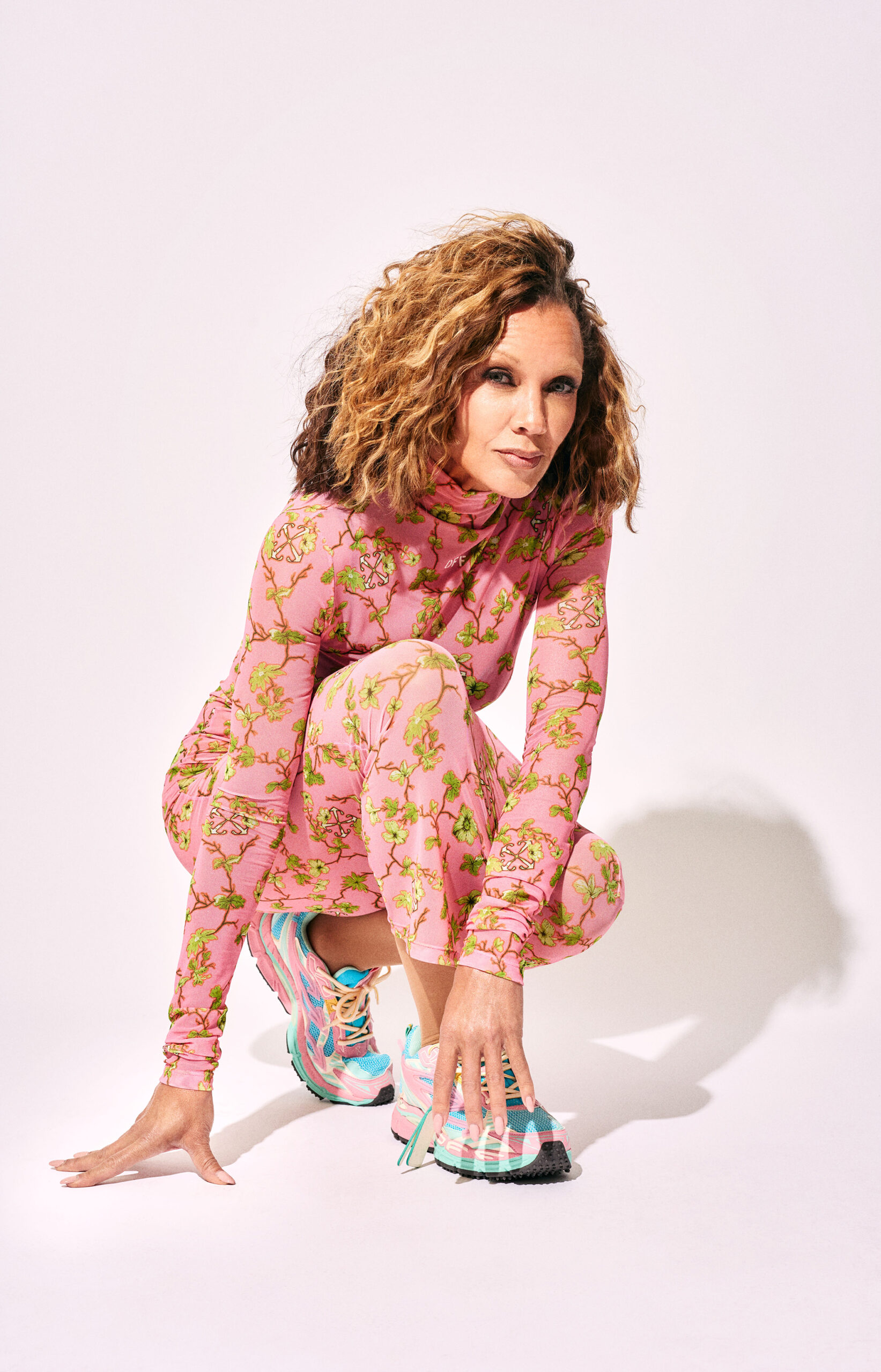
Dress and “Be Right Back” Sneakers in MiamiOff-White™.
WILLIAMS: Well you set the stage beautifully. You announced me as the diva walking into the room bringing all of the children out to dance. I think that’s where I am in my life. I’m 61. I get a chance to mentor. I’m telling these young kids, “You can do it. Relax, be succinct. This is how you get through life, with a good old bop.”
MATTEL: If you could time travel back to any moment in your career just to play it again or do something differently, what would it be?
WILLIAMS: Probably the Academy Awards, when “Colors of the Wind” [from Pocahontas] won Best Song and I got a chance to sing it with aerialists and dancers on a revolving stage. I was wearing a chocolate brown metal Versace gown. My parents were in the audience. My dad was sitting next to Tom Cruise.
MATTEL: Totally. So I have to ask, are you concerned about the election, Vanessa?
WILLIAMS: I’ll be onstage here in London in November but I will definitely send my absentee ballot, but I’m concerned. Particularly because rights have been denied over the past two years because of justices and powers that be, and it can continue to change in a way that I never thought I’d see in my lifetime in terms of freedom, especially women’s freedom.
MATTEL: I mean, Vanessa, if we’re trying to figure out what you should do next in your career, you’ve been involved in presidential things on stage. What about in real life?
WILLIAMS: I have met six or seven presidents in my lifetime. I have no desire to be in politics at all. It’s a no-win situation at this point. Things are so divisive now, it’s in- credible. I have no idea what the solution is.
MATTEL: Well, you don’t have tips for people trying to make it in politics, but I’m sure there’s young performers reading this. Do you have any tips for people who are just trying to make it in Holly- wood or in music or onstage?
WILLIAMS: I would say whatever you’re interested in, train, get your education, so if something comes up, you’ve got the skills to do it. There are always helpful people and programs everywhere. Google it. Don’t feel scared to reach out for help. Scholarships are always available. And then the fear—I think everyone is their own biggest enemy. It’s the fear of, “I shouldn’t do this, I’ve never done this before, what are people going to think of me?” Don’t worry about that. That’s how you get ahead. A door will open and it could be the right path. You just have to be brave enough to follow your gut and say, “Let’s try it. What’s the worst that can happen?”
———
Hair: Sven Bayerbach using Hair Rituel by Sisley at Carol Hayes Management.
Makeup: Grace Hayward.
Tailor: Justina Jusinskaite at Galedi.
Digital Technician: Lorenzo Profilo.
Photography Assistants: Anna Perez and Ed Phillips.
Fashion Assistant: Sade Adewale.
Production Assistant: Cindy Veleva
Post-production: La Cápsula.
Location: St. Saviors Cic.
Special Thanks: Moxy Plymouth.

